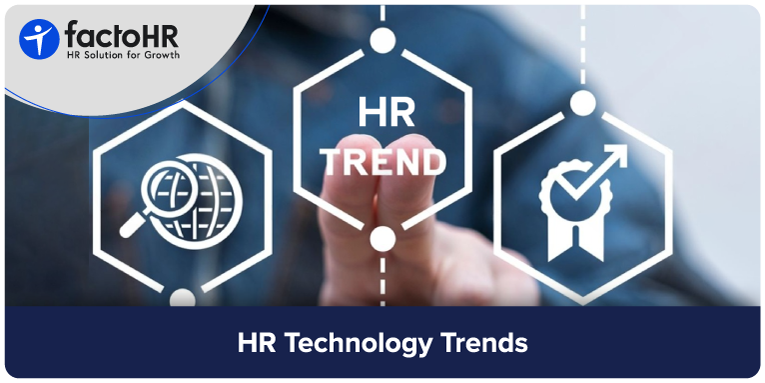Top 14 HR Technology Trends to Know about in 2026

Table of Contents
Technological advancements have transformed HR management by enabling secure data storage, task automation, and improved decision-making. As HR professionals embrace these HR technology trends, they can enhance corporate strategies and create enriching experiences for their workforce, fostering growth and success in human capital.
This post will overview the top HR technology trends for 2026. Knowledge and fairness in executing these hr tech trends help managers navigate the excellent work environment and create a healthy and engaged organization of the future.

14 HR Technology Trends for 2026
The Human Resources landscape is changing, with innovation driving the shift as technology takes over work systems. From artificial intelligence (AI) to predictive analytics, technology is now evolving HRM knowledge and methods of recruiting, talent management, and employee engagement. Read below to learn about some HR technology trends.
1. Using AI and ML for HR Functions
Artificial Intelligence (AI) and Machine Learning (ML) in Human Resources (HR) automates routine tasks and enhancing workforce analytics. HR technology, often called HR tech, includes AI chatbots and machine learning algorithms, streamlines recruitment, onboarding, and performance evaluations. This allows managers to focus on strategic decision-making and cultivate a positive work environment.
2. Focussing the Employee Experience
A great employee experience is essential for keeping top talent and maximizing productivity. As workforce needs and expectations change, professionals must go beyond focussing solely on employee engagement or particular stages in the employee lifecycle. HR technology that streamlines and optimizes the employee experience can increase retention, automate onboarding, minimize turnover, and raise productivity.
3. Blockchain Integration for Secure Data Management
Blockchain technology is revolutionizing human resource management by improving data security and reliability. This is among the emerging trends in hr technology for 2026. Blockchain’s capacity to secure and verify employee information allows managers to protect sensitive data, check the authenticity of applicant credentials, and assure compliance with privacy legislation. Increased trust and transparency can result in more efficient and safe human resource management procedures.
4. Decentralized HR and Evolving Management Skills
The shift to decentralized workforce management models emphasizes the necessity for HR professionals to adjust their abilities and adopt new management tactics. Managers use a hyperlocal approach, which empowers local teams to handle communication among workers, resulting in more agile and responsive organizations. HR departments must focus on developing leadership and mentoring abilities rather than depending primarily on traditional task-oriented management strategies.
5. Digital Learning, Training, and Development for Employees
In today’s job market, employee training and development rely heavily on digital learning tools. Virtual and augmented reality solutions can also entertain training, increase retention, and motivate employees to advance their abilities. These platforms allow businesses to provide materials, automate operations, and assist personnel in pursuing professional development. Investing in digital learning will enable organizations to promote a culture of continued advancement, adapt to changing skills needs, and increase overall employee engagement.
6. Hybrid and Remote Work Models and Supporting Technology
Hybrid and remote work models, which combine remote and in-office work, are becoming increasingly popular HR technology trends as people and organizations seek greater flexibility. To enable this transformation, managers must invest in collaboration systems, virtual communication tools, cloud-based human resource software, and workspace management tools that can accommodate remote and on-site personnel. This contributes to a consistent work experience independent of an employee’s location.
7. Handling a Growing Contingent Workforce
The contingent workforce comprises outside contractors, temporary employees, freelancers, consultants, agency employees, and anyone else who is not a regular employee in your firm. Contingent workers are a part of your staff, and the right technology enables them to remain in touch and align with other teams.
8. Initiatives that Promote Diversity, Equity, Inclusion, and Belonging (DEI & B)
DEI&B activities are essential to practice to grow a culture that embraces any employee regardless of their differences. The key learning areas that HR professionals need to cultivate with their employees are inclusiveness, equity, and diversity with belonging to the organization. Organizations that incorporate DEI&B into their recruitment, management of performance, and employee growth strategies can benefit from various perspectives, increase innovation, and foster a healthy work culture.
9. Making Data-driven Decisions
HR analytics may help firms make data-driven decisions about hiring, staffing, compensation administration, and workforce engagement. This empowers HR professionals to make informed decisions, driving business growth and employee success.
10. Employee Wellbeing and Mental Health Technologies
Taking care of employees and their mental health is crucial now more than ever. Several human resources technology trends focus on creating a psychologically safe workplace, implementing stress prevention, and offering relevant support services for those working from home. Companies use technologies that monitor employee welfare, support work-life balance, and foster a positive culture that enhances productivity among office employees and ensures remote employees’ mental health by physically connecting them.
11. Addressing Cybersecurity Concerns
As technology advances, so do the possibilities for cyberattacks and data breaches. As HR departments utilize new technologies, they must be more vigilant in protecting employee data and implementing solid cybersecurity rules and practices. This is considered the most crucial trend in HR technology since the need for data security is increasing. Encryption technology can secure devices, safeguard personal and financial information, and secure virtual private networks (VPN).
12. Persistent Employee Feedback and Communication Channels
Continuous employee feedback and communication channels are critical for managers to stay in touch with employees’ needs, attitudes, and concerns, particularly in remote work contexts. These systems enable better decision-making and develop trust between employees and management, irrespective of where they work, by allowing for frequent check-ins, pulse surveys, and open discussion channels. Investing in such automated HR tools is critical for establishing transparent and engaged staff in the office and remotely.
13. Empowering Employees with Self-service Solutions
The possibilities are infinite, ranging from self-service websites for accessing information about pay stubs and benefits to mobile apps for requesting time off and changing personal information. It’s like having a personal HR assistant at your disposal, making it easier than ever to negotiate the complexity of work.
14. Use of Chatbots and Virtual Assistants
AI chatbots and virtual assistants are lifesavers for firms that want their staff to be able to ask inquiries and receive immediate responses. These digital instruments are widely used in organizations. They can answer many questions faster and more correctly than a human.

Wrapping up
HR technology trends will continue to define the human resource field and its future. At the same time, and according to our company’s ideals, automation should aim to improve work performance, care for employees’ well-being, and reveal their creative potential. Effective HR solutions promote a positive workplace culture, encouraging connection, growth, and productivity.
Undoubtedly, such a technological transformation necessitates extensive planning, including determining the viability of ideas for new software products, ensuring that their functioning meets the standards of the target audience, and much more. We at factoHR have created software compatible with all the latest trends in hr technology. Schedule a demo with us today!
What are HR technologies?
HR technology, or HR tech, includes innovative tools that improve the efficiency of HR functions in organizations. By automating key tasks, it allows professionals to focus on what matters most, enhancing productivity and job satisfaction. Embrace HR tech for a streamlined future in HR!
What is the Latest Technological Trend in HRM?
Human resource technology is transforming workforce management. By automating administrative tasks, HR professionals can focus more on employee well-being and development. Emerging technologies like cloud, blockchain, and AI are essential to this change.
Grow your business with factoHR today
Focus on the significant decision-making tasks, transfer all your common repetitive HR tasks to factoHR and see the things falling into their place.

© 2026 Copyright factoHR


